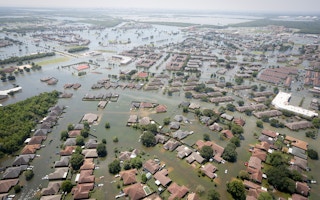There was a sliver of hope. Two years ago, heads of state and government from all over the world came together in Paris to forge a climate agreement that would limit global warming to well below two degrees Celsius and bring the consequences of climate change under some degree of control.
A mere four weeks before the next climate summit is scheduled to take place in Bonn – it will be chaired by the Fiji Islands, a developing country heavily hit by climate change – the two-degree target now seems more remote than ever.
Ever since Paris, carbon emissions have remained virtually unchanged. However, carbon dioxide is a greenhouse gas that remains in the atmosphere for around 100 years. On behalf of future generations, we should be making every effort to reduce CO2 emissions. After all, the lower we keep the rise in global warming, the less severe the consequences will be for everyone.
The sum total of all losses from weather-related catastrophes worldwide since 1980 is huge: US$ 3,277bn. Of course it is not possible to reliably quantify how much of this figure is actually attributable to climate change. But, because of the extreme loss potential involved, reinsurers need to understand exactly how the probability and extent of certain events will shift as a result of climate change.
Scientifically speaking, global warming leads to increased evaporation of water. At the same time—because of higher temperatures—the atmosphere absorbs more moisture. So there is more energy available, which is released when water vapour condenses, and there may be more rain. The weather machine picks up speed, so to speak.
“
Insurance can and will cover more losses, and thus achieve more in helping to cope with the consequences of climate change.
It is the prevailing opinion among scientists that climate change will produce a greater number of weather-related natural catastrophes in future. And a precise analysis of our loss data suggests that this is already evident in a number of regions, for instance in the form of losses from severe thunderstorms in the USA and in Europe. These storms have seen a significant increase, even after adjustment for the rise in exposed values.
The interdependencies are very complex, and it would be inappropriate to make any broad, sweeping statements. We must be cautious with what we say about hurricanes in the North Atlantic – and I mention this quite deliberately given this year’s series of hurricanes.
Unlike with other types of hazard, the scientific community is not expecting climate change to result in a general rise in the frequency of storm events, but it does anticipate more frequent, very severe storms.
There is another exciting field of research we are also engaged in: Immediately after a weather-related natural catastrophe has occurred, systematic modelling is used to estimate how much more likely this individual occurrence has become on account of climate change.
So we are gradually coming closer to the point where the consequences of climate change will be quantifiable. However, this is still going to take quite some time. And it would be unwise to refrain from taking measures designed to combat climate change and to adapt to its unavoidable consequences.
That is why Munich Re is attempting to take a systematic approach to including climate change in its business processes.
Since 2015, our business activities worldwide have been carbon-neutral. Next, our reinsurance group and our primary insurance subsidiary, ERGO, will jointly cooperate on the accelerator programme launched by Climate-KIC in order to promote climate protection with fresh ideas from the start-up scene.
Climate-KIC is the EU’s largest innovation initiative for climate-friendly technologies. The selected start-up companies will receive not only financial stimulus but also technical support from our experts.
I am already looking forward to seeing the results of the first programme. In addition, in conjunction with Solarkiosk we are building solar E-HUBBS for Africa, which will provide people in remote regions with electricity produced by solar panels to operate their mobile devices and provide access to the internet.
The main objective of insurance is to mitigate the financial impacts of loss events. Given the loss amounts caused by natural catastrophes worldwide, it is a serious problem that since 1980 less than one-third of the economic losses has been insured.
The remaining losses had to be shouldered by the countries themselves and the people living there. There is hardly any financial protection available in emerging markets and developing countries. The countries affected suffer permanent developmental setbacks from their large numbers of victims and high uninsured property losses.
One positive example of the impact insurance can have in this regard is the island nation of Dominica. In September, Dominica was ravaged by Hurricane Maria, a storm of the highest category. Only a few days later, a pool specifically set up for the small Caribbean islands announced the payout of US$ 19m from an insurance contract.
Greater insurance density could help people, companies and entire economies get back on their feet more quickly after a catastrophe has struck.
The gap in cover worldwide has lessened somewhat in the last few years, but it is still huge. Even in the USA and in Europe half – or even more – of total losses from natural catastrophes are not covered.
Insurance can and will cover more losses, and thus achieve more in helping to cope with the consequences of climate change.
Dr. Joachim Wenning is the chairman of the Board of Management of Munich Re.


















